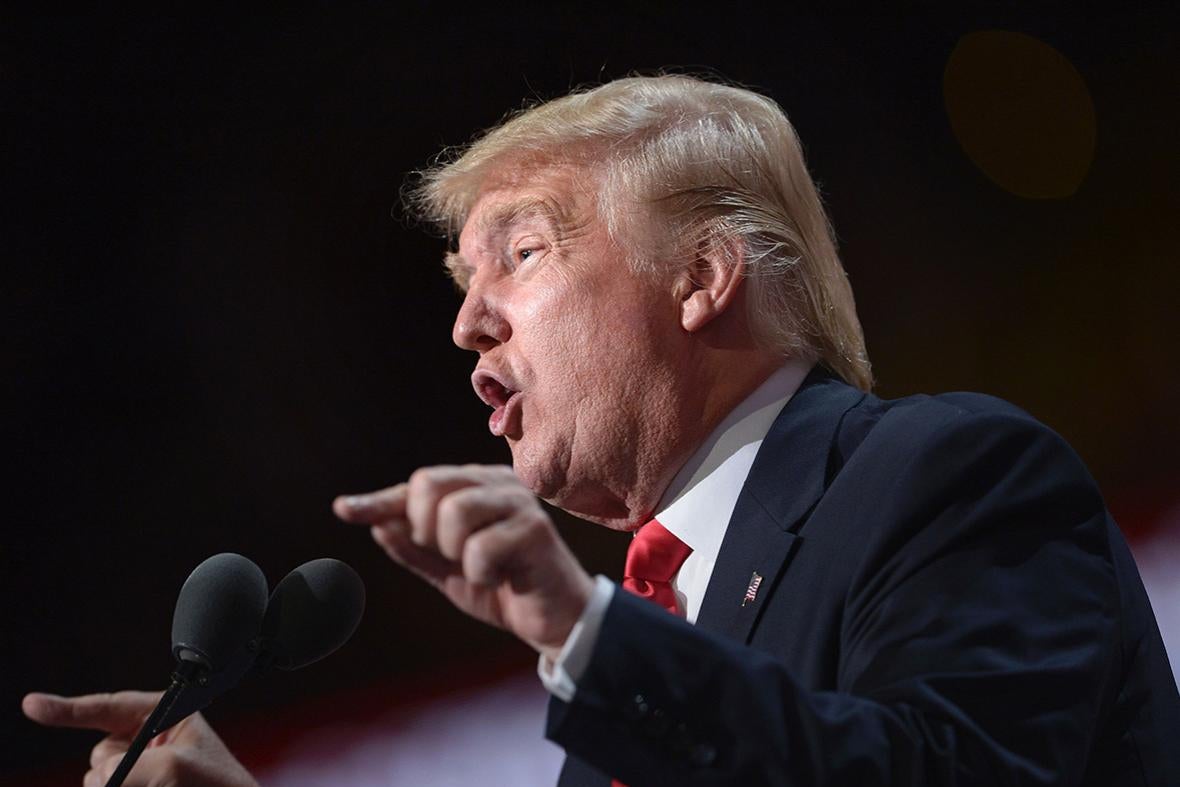CLEVELAND—I could tell by the first sentence of the leaked draft of Donald Trump’s nomination acceptance speech that it was a Stephen Miller joint.
Well, not really. It was somewhere near the 10th or 12th sentence, when Nominee Trump introduced his temporary state of emergency. What I made up top there, you see, was an exaggeration, done to honor the writing style of Miller: terse, efficient bursts of hyperbolic horror against coastal elites, immigrants, big business, foreign countries, multiculturalism, and other nefarious interests arrayed to exterminate working-class white men from existence. In Miller’s voice, those interests are attempting to kill you, friend, and everything you love, and you should hate them. This is how Miller, technically a senior policy adviser, speaks. It is intense. It is ugly. It is frequently effective. Just as Donald Trump’s speech was Thursday night.
I first saw Miller on the trail in April, where he opened a series of rallies for Trump. “His bromides are a pure distillation of white working-class resentment against the elites,” I wrote at the time, “and his function at Trump rallies is to get all the important information out there before Trump takes the stage and rants haphazardly about whatever’s on his mind.” He understands the right-wing populist seam that Trump inadvertently struck at the beginning of his campaign better than Trump does. Though Trump would always prefer to speak extemporaneously, Papa Manafort wouldn’t allow that for an occasion like tonight. So in the biggest political speech of the year—one of the generation-defining speeches in Republican politics, really—the voice we heard belonged to snarling, 30-year-old Stephen Miller, until earlier this year an aide to Sen. Jeff Sessions.
For example (and I’m quoting here from the leaked text): “But to this Administration, their amazing daughter was just one more American life that wasn’t worth protecting. One more child to sacrifice on the altar of open borders.” This is a Stephen Miller line. It does not merely criticize a policy of Barack Obama’s. It suggests—not suggests; it says, explicitly!—that Obama sacrificed a child to pursue some pantywaist internationalist objective hazily defined as “open borders.” It is a nonsense line soaked in blood for effect.
“Americanism, not globalism, will be our credo!” is a Stephen Miller line, and probably the most charmingly old-timey fascist construction of the speech. Miller draws deeply from nationalist rhetoric, and in nationalist rhetoric, globalism is the bad guy. This was not rhetoric you heard in mainstream party politics prior to this cycle.
“Big business, elite media and major donors are lining up behind the campaign of my opponent because they know she will keep our rigged system in place” is a Stephen Miller line. No one in mainstream Republican speechwriting would ever mention “big business” as among the arrayed enemies.
At his best—once he’s finished stacking the dismembered bodies of those murdered by the undocumented immigrant, hiding around the corner on a dark night—Miller draws an unbreakable emotional bond between Trump and his core supporters: If not Trump, we are told, there will be no one to save the average American from the globalist plan, or—and this is really what it’s about—a culture that’s leaving them behind.
“My opponent asks her supporters to recite a three-word loyalty pledge,” Miller wrote in the speech’s best-written passage. “It reads: ‘I’m With Her.’ I choose to recite a different pledge. My pledge reads: ‘I’M WITH YOU, THE AMERICAN PEOPLE.’ ” And then: “I am your voice.”
Trump, as we saw over the course of his interminable delivery, is a poor orator who often misses his mark, and in his speech he flubbed the line, delivering it as an afterthought, a thing that got in the way on the teleprompter. It’s a clever line, though, in its way: It critiques Clinton’s slogan for its narcissism by saying he is the voice of America.
But it raises a terrifying possibility. If Trump’s is the voice of America, that means Stephen Miller’s is, too. Can you be frightened by your own voice?
